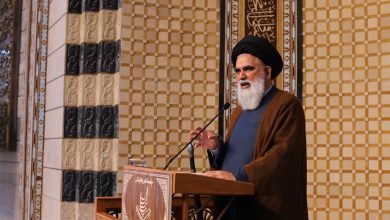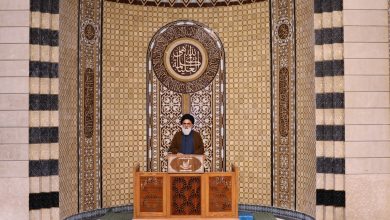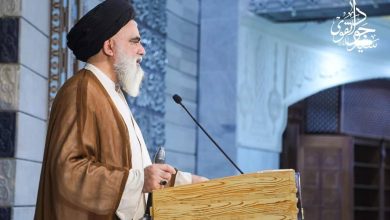
Hujjatul Islam Ustad Syed Jawad Naqvi
(Principal Jamia Orwatul Wuthqa – Lahore)
Delivered at: Masjid Baitul ul Ateeq
Lahore – Pakistan
Friday Sermon 9th May – 2025
Sermon 1 : India’s aggression on Pakistan is due to weakness of Pakistan caused by internal Fitnah’s
Sermon 2: Orwatul Wuthqa announces readiness for defending Pakistan by stepping out on streets after Friday prayers
A biggest threat for Man in individual, social, religious and economic life is Fitnah (Sedition). Allah has ordained believers to acquire Taqwa for protect from Fitnah
In Surah Anfal , verse 25
وَاتَّقُوا فِتْنَةً لَا تُصِيبَنَّ الَّذِينَ ظَلَمُوا مِنْكُمْ خَاصَّةً ۖ وَاعْلَمُوا أَنَّ اللَّهَ شَدِيدُ الْعِقَابِ {25}
And fear an affliction which may not smite those of you in particular who are unjust; and know that Allah is severe in requiting (evil)
Not every strategy or plan can shield against Fitnah (sedition); it requires a specifically tailored approach. Amirul Momineen (a) provided comprehensive insights into how seditions are born, nurtured, grow in strength, and ultimately bring destruction.
One of the key consequences of Fitnah is the emergence of weakness and cowardice. Even the most powerful nations, once affected by Fitnah, become fragile—just as an illness weakens the body. This vulnerability then becomes an entry point for other ailments. When the immune system is compromised due to a viral attack, the body becomes susceptible to germs, bacteria, and further infections.
Pakistan is currently facing such a crisis, where a hostile and aggressive enemy, India, has launched attacks. These offensives are part of a long-standing, carefully devised plan carried out with their allies. Over the last three days, they have repeatedly targeted Pakistan with drone attacks—six to eight just today. This aggression is ongoing, and the question arises: Why did India implement this plan to attack Pakistan now?
While there are multiple reasons, one critical factor is linked to Fitnah. Internal seditions have weakened Pakistan, and this vulnerability has not gone unnoticed by the enemy. Recognizing Pakistan’s fragile state, India has intensified its aggression and may continue to do so.
In Pakistan, many individuals benefit from the nation—earning wages and occupying positions—yet harbor no genuine love or concern for the country, its people, or its future. Despite claiming to love Pakistan, they have failed to act in its interest. Numerous groups and sectors within the country have fallen prey to Fitnah. While concerned voices have long pointed this out, these warnings have largely gone unheeded.
From the time Allah granted me awareness, I have consistently highlighted that Pakistan is besieged by Fitnah—originating from within. Two major groups are to blame:
1. Power-hungry politicians and rulers—both military and civilian—who have been intoxicated by their lust for authority. In pursuit of power, they have nurtured and fueled Fitnah. Many have even ridden its waves to reach positions of influence. Some generals have exploited division, sectarianism, and even terrorism for power, consequences of which the nation is bearing today.
2. The religious elite—those who betrayed both their faith and the nation—have actively participated in constructing Fitnah. Politicians incited these religious figures, who in turn allied with politicians and generals to sow seeds of discord, weakening the nation from within.
Pre-existing issues like sectarianism, tribalism, and linguistic discrimination only added fuel to the fire. Two of the most destructive outcomes—sectarianism and terrorism—are deeply intertwined, the latter being born from the former, and both driven by those hungry for power.
This Fitnah has deeply undermined Pakistan. In pursuit of political gains, none of the ruling classes have truly served the nation—they have all been driven by selfish ambitions. In the past, Pakistan had a stronger stance against India because internal seditions were fewer. But now, the country is visibly weakened and sick. Even the military has suffered, with its leadership enabling individuals to come into power who later undermined the institution itself.
Pakistan’s enemies closely monitor the country. They watch for political instability, economic decline, and national disunity. Recognizing our current weakness, they have launched these attacks. Despite possessing various forms of power, Pakistan’s internal Fitnahs have created vulnerabilities that invited aggression.
Now that war has been forced upon us, we must confront it, regardless of our internal situation. War demands swift action: the first principle is to eliminate internal weaknesses and restore strength. Every possible strategy and resource must be mobilized and implemented in the battlefield. Each segment of society—the people, the rulers, and the religious scholars—has specific responsibilities. Weaknesses must be addressed not over weeks or months, but within days, so that a united message of strength is conveyed to the enemy from all sectors.
As scholars, our duty includes advising rulers—not just praising them but also offering critical counsel when needed. Whether or not they heed this advice is their responsibility. The people, too, must revive their collective strength. Fitnah has fragmented us into groups, parties, and organizations, spreading hatred that manifests most visibly on social media. These platforms have portrayed Pakistanis as intolerant and divisive, a perception shaped by irresponsible behavior.
Reflecting on our history reveals how, in every era, new seditions have weakened the nation. I have delivered lectures on this, compiled in a book, emphasizing the need to uproot the seeds of Fitnah and destroy its harvest. Today, all segments of society—religious, secular, and patriotic—must take meaningful steps to eliminate Fitnah.
On social media, religious personalities often spread divisive content just to gain views and income. The most viewed videos are often those spreading discord. Reformers rarely get the same attention. This illustrates a disturbing trend in our society: an increasing appetite for sedition. This mindset is regressive and damaging.
During war, the laws change—emergency measures override routine activities. In this state of emergency, those who wish to defend Pakistan must denounce and distance themselves from seditionists. Stop watching and supporting them. These individuals thrive on views and attention; your disapproval will weaken them. No true follower of Imam Ali (a) can be a subscriber to such pages or channels—only a hypocrite would be, because Imam Ali (a) detested Fitnah.
We must adopt Taqwa (God-consciousness) in the face of sedition. Allah has cursed Fitnah, and Paradise is reserved for the God-conscious. If you’re spreading hatred, you’re contributing to the weakening of Pakistan. Any damage inflicted by enemies becomes your burden as well.
Despite being a nuclear power, Pakistan is under attack. This implies that the enemy has received signals of internal weakness. This war is not India’s alone—Israel and the United States are also involved. India supported Israel during the Gaza war, even sending Indian personnel to assist. In return, Israel is now aiding India, supplying advanced weapons and drones, a fact acknowledged in the media.
This plan wasn’t conceived recently—it began long ago. I can provide evidence of all the forces now arrayed against Pakistan. Those who opposed our nuclear capabilities are now India’s allies. They have assured India that Pakistan won’t deploy nuclear weapons. These so-called “friends of Pakistan” are anything but.
Israel is India’s full-time partner in this war, providing intelligence, surveillance, and weaponry. America, too, is involved. Our current Foreign Minister, Ishaq Dar, is unusually active—visiting countries, even appealing to Somalia, a nation in turmoil itself, for help. The U.S. has stated it will remain neutral, but history shows that America never stays out of conflicts involving Muslim nations. In fact, the U.S. motivated and enabled India to start this aggression.
From Trump’s earliest days in office, he targeted two nations: Saudi Arabia and India—for arms deals. He sold $1 trillion in arms to Saudi Arabia and $300 billion to India, all for war. These weren’t random sales—there was an agenda. India was clearly told how and when the war would begin. This isn’t hidden knowledge; even our politicians know it, though they may act otherwise. The U.S. always backs those who buy its weapons—thus it stands with India. Israel, too, has proven its alliance through action.
The only way forward now is to fight back. This includes a national campaign to end Fitnah. We must reject seditionists, stop watching them, and cast out the seeds of Fitnah. If seditions remain, Pakistan will remain in danger. Everyone must contribute to this war against Fitnah. Those spreading rumors, hatred, and despair are enemies from within.
Today, on this Friday, we renew our pledge: to defend Pakistan at any cost and to eradicate Fitnah from our land. May Allah grant strength and courage to Pakistan’s armed forces
SERMON 2
Today is the test, examination of the nation of Pakistan and we are not prepared for this stage in every group can be seen. Allah (a) for the sake of preparation has the made of system of nurturing , worship and Friday is one such day of preparation. We have transformed Friday into a ritual which has lost its spirit. Daily Salaat are also for preparation and even Friday is for the same. In the last few days of discussions in the lecture of Tabyeen.
وَإِذْ أَخَذْنَا مِيثَاقَ بَنِي إِسْرَائِيلَ لَا تَعْبُدُونَ إِلَّا اللَّهَ وَبِالْوَالِدَيْنِ إِحْسَانًا وَذِي الْقُرْبَىٰ وَالْيَتَامَىٰ وَالْمَسَاكِينِ وَقُولُوا لِلنَّاسِ حُسْنًا وَأَقِيمُوا الصَّلَاةَ وَآتُوا الزَّكَاةَ ثُمَّ تَوَلَّيْتُمْ إِلَّا قَلِيلًا مِنْكُمْ وَأَنْتُمْ مُعْرِضُونَ {83}
And when We made a covenant with the children of Israel: You shall not serve any but Allah and (you shall do) good to (your) parents, and to the near of kin and to the orphans and the needy, and you shall speak to men good words and keep up prayer and pay the poor-rate. Then you turned back except a few of you and (now too) you turn aside
In explaining this verse, some scholars have claimed it refers to obedience to parents. However, this interpretation is incorrect. The verse is not about servitude to parents, but rather states that servitude (ʿubūdiyyah) is solely for Allah, while kindness and goodness (iḥsān) are what should be shown to parents—not obedience in the absolute sense of worship.
The term ‘Abd refers to someone who is prepared for obedience. In classical Arabic, it was also used to describe a road prepared and paved for people to walk on. The Qur’an emphasizes that before obeying, one must be made ready for obedience—and this preparation itself is ‘ibādah (worship). The entire system of worship, especially the daily ṣalāh (prayer), exists for this very purpose: to condition and prepare us for obedience to Allah.
Among all acts of worship, Jumu’ah (Friday prayer) holds a distinguished position, emphasized in both the Qur’an and hadith. Unfortunately, due to certain doubts and neglect, we have abandoned this critical system of preparation. The term Jumu’ah means “gathering”—meant to unite the community, organize them, and prepare them spiritually and ideologically. All the sermons delivered by the Prophet (s) and Imam Ali (a) on Fridays were intended to prepare the nation. Today, however, we attend Friday prayers as a mere ritual and then leave unchanged. There is now a dire need to restore the true essence of Friday sermons as a tool of national and spiritual preparation.
In the current state of war, we are unprepared. Indian drones have penetrated deep into Pakistan, reaching areas like Rawalpindi and Attock. Every segment of society that bears any form of weakness must eliminate it. If we do not have the weapons or means to defend our nation, then this is nothing short of treachery—and those responsible are criminals. We must prepare for war.
There are multiple fronts in warfare. The first is the front line, where soldiers confront the enemy directly. The second line consists of those who support the front line—providing logistics, weapons, food, and intelligence. The third front lies in our cities, villages, and homes. Every individual must recognize and take responsibility for their front.
During wartime, even a madrasah becomes a battlefield. When scholars claimed their duty was limited to study, Imam Khomeini (r.a) reminded them that if Saddam reached Qom, he would not spare anyone—including scholars. The decisive role in any war lies with those who ignite passion, inspire the fighters, and stand by them with unwavering support.
When the nation is at war, we must all adopt a wartime mindset. Had we truly valued and implemented the spirit of Friday sermons, we could have prepared our communities better. Now, we must act without delay. On this Friday, we must publicly declare our readiness for war. It is our duty to mobilize and prepare those who are still unprepared. As long as the conflict continues, we must remain steadfast in the battlefield of sacrifice and service.
This is not the time to criticize the army or highlight its weaknesses. Anyone doing so is not only foolish but also a traitor. Today, you must set an example for all of Pakistan. Imam Khomeini (r.a) stood against global arrogance with the strength of his people. He once advised that every nation should form brigades of people ready to defend the homeland.
Today, we must act—and revive the Friday of the era of the Holy Prophet (s). After Jumu’ah, gather into groups—ideally in sets of 40—organized by age. Use the banners that have been prepared under various names. This symbolic action will declare our readiness to sacrifice for the nation.
We must also send a message to the people: do not be afraid. Come out and take your place in the field. Let the enemy know that the social media voices they hear do not represent the true spirit of Pakistan. Today, the students of Jamia Orwatul Wuthqa must show their fruits—this is your moment.
Let the Foreign Minister continue his diplomacy, but the Interior Minister must immediately open the route to Parachinar. Once opened, you will see hundreds of brigades rise from there to defend Pakistan. The Hussainis will emerge—just as the world saw Hezbollah stand firm against Israel, these Hussainis will stand firm against India.
You must organize your groups today and take the field—not to block roads but to form a symbolic defense brigade of Pakistan. The media will show these images to the world, to Modi, and to Israel. This is how we demonstrate our preparedness.
But this action must not be short-lived. We should not return to our routines after this. As long as the nation needs us, we must be ready to give our lives. This is the school of Imam Hussain (a), Imam Ali (a), and the legacy of Imam Khomeini (r.a). If Nasrallah could sacrifice himself for Palestine, then surely the Nasrallahs of Pakistan can rise to defend their own land.
O Allah, never let the day come when Pakistan is occupied and we are still alive. We will defend every inch of this land, cultivate it with our blood, and lay down our lives for it. We are followers of Imam Hussain (a)—not those who sit in comfort while Gaza is destroyed. If our inaction invited the enemy to our doorstep, let our action now drive them back into the graves of their homelands.
This is only the beginning—and today we announce our full readiness. Allah has blessed us with the gift of Pakistan. Let us now show our gratitude with our actions.




